news
The musicians of Poznan Philharmonic Orchestra, missing the contact with the audience, would like to share with the music lovers the joy of music-making, though not yet in the orchestral form.
We welcome you to listen to Szymon Guzowski, the double bass player and soloist of Poznan Philharmonic Orchestra, who plays a self-composed cadence to the Concerto for Double Bass and Orchestra No. 2 by Karl Ditter von Dittersdorf.
The virtuoso cadence in the instrumental concerts of the 18th century, which existed mainly in the form of the coda of the first, fast movement, was the moment for the solo performer to show his skills. Initially the cadences were improvised, then – written down by the virtuosos of particular instruments.
The Concerto for Double Bass composed by the 18th century Austrian composer Karl Ditter von Dittersdorf (1739-1799) is one of more than 20 concerts he wrote for solo instruments and orchestra. Von Dittersdorf, being an active violinist himself, also left behind over 40 operas and 100 symphonies. He is also one of the most important authors of singspiel (one of his works, “Doktor und Apotheker”, is staged until now). What’s the most characteristic in the composer’s style is the transition from baroque to classicistic style – the evolving figurations are replaced by distinctly diversified melodic sections.
We would like to invite you to take part in the continuation of the unusual event based on the popular Q&A (questions and answers) formula. This time the responses to your inquiries will be given by Daniel Stabrawa.
When the young, 28-year-old Polish violinist Daniel Stabrawa began his job in the Berlin Philharmonic Orchestra in 1983, he thought that the dream of his lifetime was fulfilled. However, that was only the beginning – three years later he became first concertmaster of this ensemble, which is one of the most excellent and most famous orchestras in the world, and this choice was made personally by the then chef of the orchestra – Herbert von Karajan.
And he has been holding the post of the first concertmaster and soloist until today. Music lovers from Poznan know him as an eminent violinist and conductor, for the musician feels comfortable both with the group of violins – in the orchestra and as a soloist – and with the baton. We could admire both of these talents during the concerts of Daniel Stabrawa with Poznan Philharmonic Orchestra.
The arist led the Chamber Orchestra of Berliner Philharmoniker on numerous occasions in the most prestigious concert halls in the world. He is also the first violinist of Philharmonia Quartet Berlin, which has rapidly gained global recognition and renown. The critics count him among the world’s elite of this kind of ensembles, as one of the American reviewers even wrote: ‘it assigns the international artistic standard of quartets’.
The questions can be sent by an internet form till the 1st of May: the form
The answers to the most interesting inquiries will appear on our website and Facebook profile on the 6th of May.
We encourage you to pose questions!
Next Friday, on the 24th of April at 7 p.m. during the subsequent INTERNET CONCERT you will have an opportunity to listen to Symphony No. 4 in B flat major, Op. 60 by Ludwig van Beethoven performed by Poznan Philharmonic Orchestra led by Tadeusz Strugała. The concert, which marked the 60th anniversary of Tadeusz Strugała’s artistic work, was held on the 18th of December 2015 in AMU Concert Hall in Poznan. The film recording was done by INEA company.
We encourage you to read the introduction to the program of the concert.
Ludwig van Beethoven – Symphony No. 4 in B flat major, Op. 60
Symphony No. 4 in B flat major, Op. 60 by Ludwig van Beethoven, which was completed in 1806 and performed for the first time a year later in Vienna, contrasts significantly with two revolutionary symphonies of the composer written in the same period – Symphony No. 3 in E flat major Eroica and Symphony No. 5 in C minor. It is hard to seek hidden serious, nonmusical content referring to grand ideas in this unusually cheerful and bright Symphony, as opposed to the two aforementioned works. This piece is indicated as a Haydn-type Symphony, with a characteristic longer introduction before the first movement, classical symmetry, well-balanced sound of all the instrumental sections, as well as the typical four-movement form involving sonata-allegro, slow movement, minuet (it is worth mentioning that in the previous symphonies Beethoven replaced it with scherzo) and Finale in the form of a rondo.
First movement, although it opens with a somber Adagio introduction, not consistent with the rest of the piece (some point it out as an example of Beethoven’s musical irony), soon clears up in Allegro vivace. Two joyful and classically contrasting themes are introduced here. The optimistic mood of the allegro will dominate till the end of the Symphony, including the second movement (Adagio). This part, however, due to its slower tempo is filled with more lyrical themes – it is worth to focus on the melodious clarinet theme. Third movement (Allegro vivace) enlivens the symphony after the soothing second movement. Though formally a minuet, it diverges from classical minuets by Joseph Haydn or Wolfgang Amadeus Mozart owing to the agility of the themes and unique syncopated, slightly folk rhythmic. Finale – Allegro ma non troppo – is a rondo filled with musical joke, chiefly in the humourous parts played by woodwinds. The whole movement shows vigorous motility evoked by perpetually fragmented rhythm. At the end of the finale Beethoven unexpectedly turns the volume down in the whole orchestra in order to wittily introduce the tutti chords of the cadence.
Jakub Kasperski
(excerpt of the program of the concert, 18th of December 2015)
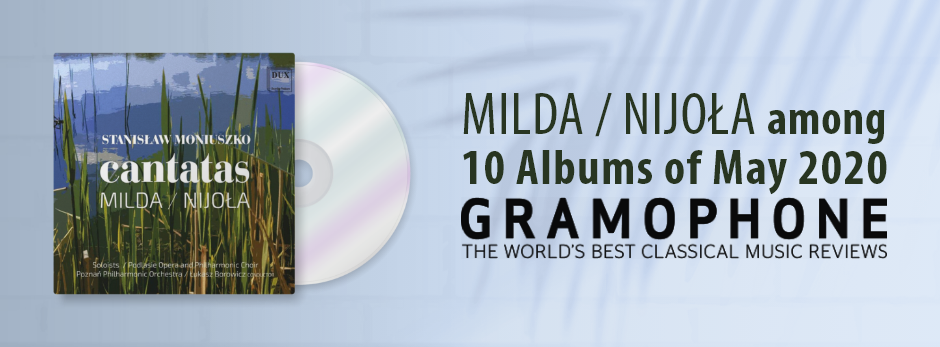
Double album of “Milda” & ”Nijoła” cantatas by Stanisław Moniuszko appeared on the May list of best CD album chosen by the prestigious British magazine devoted to classical music – Gramophone.
“Milda” and “Nijoła”, now almost unknown cantatas composed by Stanisław Moniuszko, were recorded by Poznan Philharmonic Orchestra along with the soloists: Wioletta Chodowicz (soprano), Maria Jaskulska-Chrenowicz (soprano), Ewa Wolak (mezzosoprano), Sylwester Smulczyński (tenor), Robert Gierlach (baritone), Szymon Kobyliński (basso) and Opera and Philharmonic Choir prepared by Violetta Bielecka. The whole piece was conducted by Łukasz Borowicz. The album, which was the world phonographic premiere, was released by DUX label in October 2019.
Both cantatas refer to Lithuanian mythology and are based on “Witolorauda” – first part of the “Anafelias” epic poem by Józef Ignacy Kraszewski, who also wrote the libretto for “Milda”.
The Gramophone list of ten CDs of May include such albums as “Górecki – String Quartet No. 3/ Sonata for Two Violins” performed by Tippett Quartet (Naxos) and “Adès – Piano Concerto. Totentanz” played by Kirill Gerstein (piano) and Boston Symphony Orchestra led by Thomas Adès (DG).
More details here: The best new classical albums: Editor’s Choice, May 2020
Do you come to concerts? Do you go with Poznan Philharmonic Friends’ Club for concerts of its orchestra outside Poznan? Do you take your photo camera or use a smartphone? Not during concerts of course, as its strictly forbidden then. But maybe you succeeded in taking a photo shoot of an interesting (or funny?) moment connected with the performance, an unforgettable time of meeting your favourite artist, something that takes a special place in your memory – share it with us. Send us a photo (maximum two) with a one-sentence description informing what it depicts, and we will post it on our Facebook profile and ask music lovers to assess them. The authors of three photographs with the largest amount of “likes” will receive a musical surprise reward.
Please send the photos to the following address: sekretariat@filharmoniapoznanska.pl till the end of April. The results of the competition are on the 5th of May.
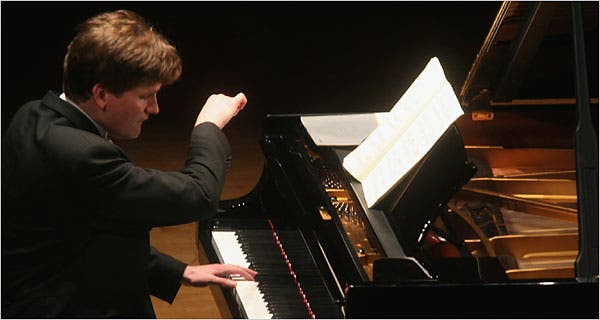
Olli Mustonen, a prominent Finnish pianist, whose artistry we could admire in AMU Concert Hall, performs today (16th of April) in a Beethoven recital in the auditorium in Turku (Finland). The concert will be transmitted online. Start of the concert at 7 p.m. local time (6 p.m. in Poland).
You are welcome to listen!
We invite you to take part in the special project based on the popular Q&A (questions and answers) formula. The responses to your inquiries will be given by Maestro Marek Pijarowski, Maestro Łukasz Borowicz and Director of the Poznan Philharmonic Wojciech Nentwig.
The questions can be sent by an internet form:
- We are waiting for the questions to Maestro Łukasz Borowicz till the 17th of April: form
- We are waiting for the questions to Director Wojciech Nentwig till the 21st of April: form
- We are waiting for the questions to Maestro Marek Pijarowski till the 24th of April: form
The answers to the most interesting inquiries will be published on our Facebook profile respectively on the 20th, 25th and 28th of April.
We encourage you to pose questions!
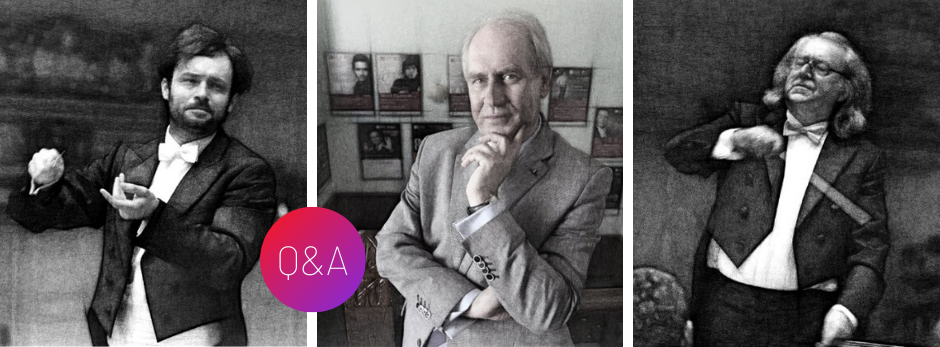
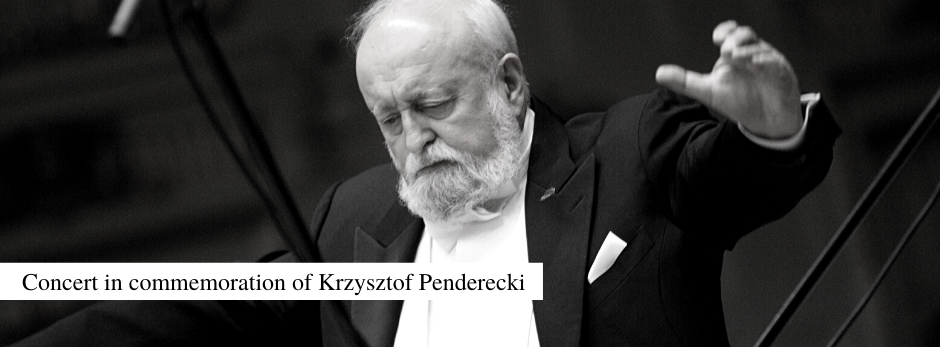
Next Friday, on the 17th of April at 7 p.m., we invite you to the next internet concert of Poznan Philharmonic. This time the hero of the evening is Krzysztof Penderecki, who passed away recently. We will recall him as a composer and as a conductor.
We are going to present music lovers the recording of a concert performed by Poznan Philharmonic Orchestra and soloists: Fumiaki Miura (violin) and Julian Rachlin (viola), under the baton of maestro Krzysztof Penderecki. The concert was held in AMU Concert Hall in Poznan on the 23rd of November 2012 and aired by Polish Radio Program II, which lent us this recording for the forthcoming internet concert.
The Poznan concert from eight years ago was special due to many reasons, though two of them were of particular importance to us – on the 23rd of November 2012 Krzysztof Penderecki celebrated his 79th birthday (hence the title of the concert, “Maestro’s Birthday”), and the composer suggested to perform with our philharmonic orchestra a Polish premiere of his recent symphonic piece – Double Concert for violin, viola and orchestra, which only a month ago had its world premiere in the Golden Hall of Musikverein in Vienna. In the capital of Austra Mariss Jansons conducted the work, while in AMU Concert Hall – the composers (in both performances Julian Rachlin, to whom the piece was dedicated, played the solo part on viola). In the second part of the concert held on the 23rd of November 2012 Krzysztof Penderecki led one of his favourite symphonies – No. 7 in A major, Op. 92 by Ludwig van Beethoven.
Double Concert for violin, viola and orchestra surprises with its lyricism from the first chords, as well as its sensitivity to timbre and the perfection in building the suspense. Although it lacks the effects of spectacular virtuosity, the extreme difficulty of both parts is to show variability of themes and bring out the quality of the musical discourse. The piece is not a heated debate, but a smart dialogue of two mature personalities. The rich and multi-layered texture of the Concert is characterised by splendid instrumentation, intense tones which merge in the orchestral tutti. It perfectly blends with the expression of diversified emotions, thus the structure of the work is consistent and dramatized.
In the second part of the evening Symphony No. 7 in A major, Op. 92 by Ludwig van Beethoven resounded – a real orgy of rhythm and symphony of humour, as the piece was acclaimed a day after its premiere held on the 8th of December 1813 in Great Hall of the University of Vienna. Richard Wagner deemed the vigorous Symphony No. 7 by Beethoven the apotheosis of dance, and the composer himself admitted that while writing the work he wanted to refer to orgiastic Roman Bacchanalia. To him the following quote is ascribed: music is the wine which inspires one to create, and I am Bacchus who pours the mankind the delicious drink and make them spiritually drunken.
Performers:
Fumiaki MIURA – violin
Julian RACHLIN – viola
Krzysztof PENDERECKI – conductor
Poznan Philharmonic Orchestra
Program:
- Krzysztof Penderecki – Double Concert for violin, viola and orchestra (Polish premiere)
- Ludwig van Beethoven – Symphony No. 7 in A major, Op. 92
Poco sostenuto – Vivace
Allegretto
Assai meno presto
Allegro con brio
Next Friday, on the 10th of April, this time uniquely at 3 p.m. we invite you to listen to Symphony No. 3 “Symphony of Sorrowful Songs” for soprano solo and orchestra, Op. 36 by Henryk Mikołaj Górecki. It was recorded by Poznan Philharmonic Orchestra during the concert held on the 4th of February 1995 in AMU Concert Hall in Poznan. The recording is in the form of an album. It was produced by DUX label, but hasn’t been released until 23 years later – on the 10th of January 2018. Symphony No. 3 previously resounded in AMU Concert Hall on the 18th of January 2019 during the concert commemorating Paweł Adamowicz, the murdered mayor of Gdansk.
Symphony No. 3 by Henryk Mikołaj Górecki is one of the most original masterpieces of the 20th century music (not only Polish). Adrian Thomas, the English biographer of the composer, wrote these words about the piece: “… The Symphony features a prayerful, transcendental aura supported by simplicity and straightforwardness. It evokes the ambience of concentration and inclines to quiet contemplation…”
The lyrics of the three movements are three laments, monologues – the 15th century lament of Virgin Mary to the dying Jesus, the prayer of a girl to Mary, engraved in the wall of the prison cell in the Gestapo headquarters in Zakopane during World War II, and a mother’s grievance after the death of her son in one of the Silesian Uprisings. Following subsequently, the lyrics plainly determine the piece the passage from divine to human things, from metaphysics to earthly reality.
“Symphony of Sorrowful Songs” is an exceptional piece to listen to just on Good Friday.
Performers:
Ewa IŻYKOWSKA – Soprano
Andrzej BOREYKO – conductor
Poznan Philharmonic Orchestra Henryk
Mikołaj Górecki (1933-2010)
Symphony No. 3 “Symphony of Sorrowful Songs” for soprano solo and orchestra, Op. 36
Lento. Sostenuto tranquillo ma cantabile
Lento e largo. Tranquilissimo – cantabilissimo – dolcissimo – legatissimo
Lento. Cantabile-semplice
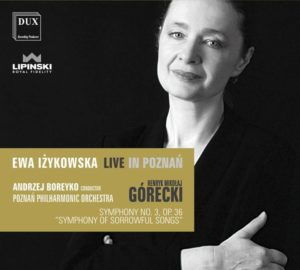
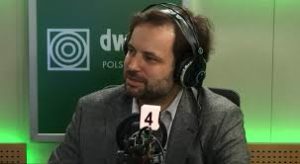
This week, every day at 10 a.m., Polish Radio Program II invites you to the cycle of meetings with Maestro Łukasz Borowicz, who has been the Chief Guest Conductor of Poznan Philharmonic since 2006. It is worth listening both to the radio broadcast, as well as the recordings suggested by the Meastro. We warmly recommend and invite you to listen!

